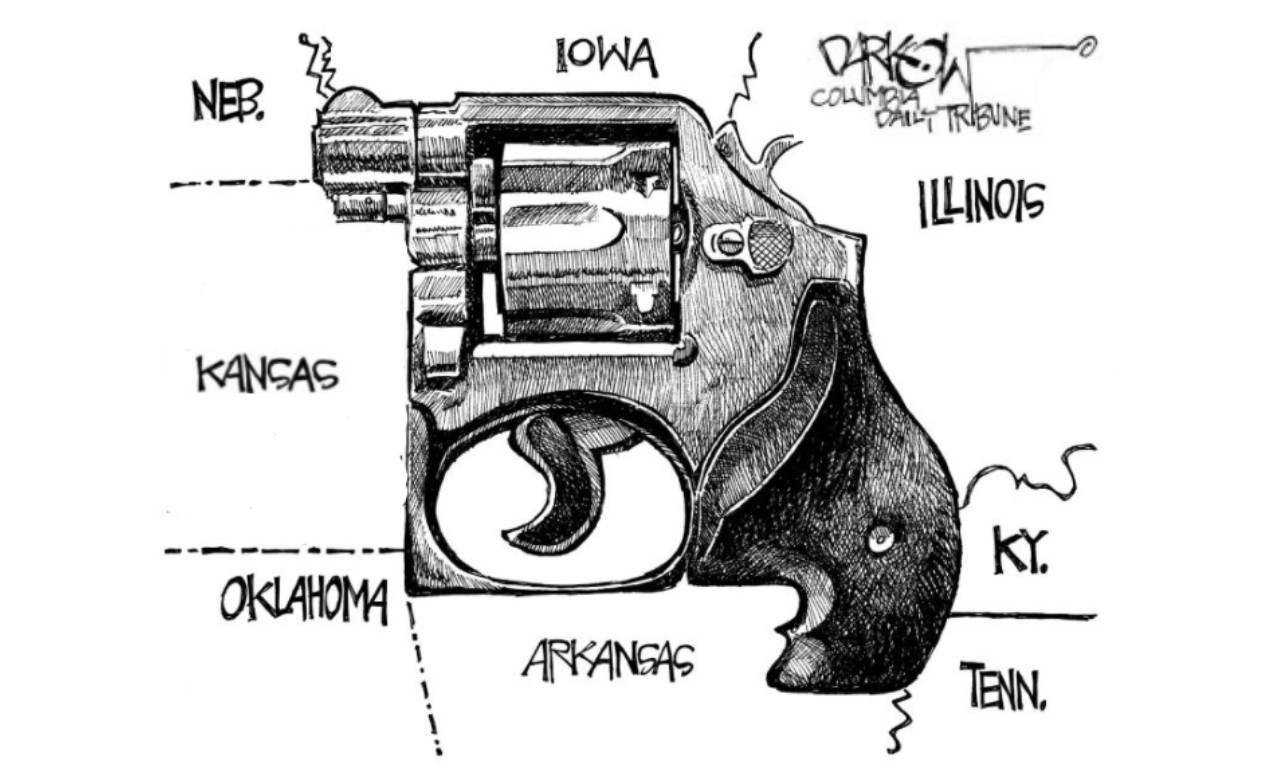The Constitutionality of the 2021 HB85 Second Amendment Preservation Act (SAPA) in Missouri is being challenged, and the Justice Department under Joe Biden has taken sides. Biden had foreshadowed aims at stricter gun control prior to his election, which is a reason given by Missouri and other states for passing laws like HB 85 to assert State's rights in allowing uninfringed gun ownership within its borders, free of intervention by Federal Supremacy.
The Justice Department (DOJ) filed a Statement of Interest Wednesday that summarizes its legal argument in opposition to HB85:
"House Bill No. 85, known as the Second Amendment Preservation Act (hereafter 'HB85' or 'SAPA'), purports to nullify certain federal firearm laws, prohibits enforcement of those federal firearm laws, and imposes civil monetary penalties on political subdivisions and state law enforcement agencies that enforce, or assist in the enforcement of, those federal firearm laws. The United States understands that this Court will consider the legality of HB85 in a hearing currently scheduled for August 19, 2021. Accordingly, pursuant to 28 U.S.C. § 517,1 the United States respectfully submits this Statement of Interest to assist the Court in evaluating whether HB85 is invalid under the United States Constitution and whether HB85 should be enjoined. Specifically, for the reasons set forth below, the United States supports a declaration that HB85 is unconstitutional and an injunction against its enforcement."
The case referenced was filed in the Circuit Court of Cole County, Missouri, by the City of St. Louis, St. Louis County, and Jackson County against the State of Missouri. The case claims the unconstitutionality of HB85 (formerly HB310) and requests a declaration recognizing as much with an injunction against its enforcement.
"This Petition for Declaratory Judgement and injunctive relief does not to ask the Court to infringe upon any constitutionally guaranteed right of law-abiding individuals, including the right to bear arms; rather, the Plaintiffs ask the Court to recognize that HB 85 infringes upon the constitutional rights guaranteed by both the Missouri and United States’ constitutions and curtail law enforcement officers’ ability to investigate, apprehend and prosecute criminals."
The DOJ's Statement of Interest is a filing within the case that cites 17 statutes, seven Federal regulations, and 46 prior cases that it remarks render HB 85 legally invalid. With the Supremacy Clause of the United States Constitution, the Justice Department (DOJ) argues that States have no authority to make laws contrary to existing federal gun laws:
"This Constitution, and the Laws of the United States which shall be made in Pursuance thereof; and all Treaties made, or which shall be made, under the Authority of the United States, shall be the supreme Law of the Land; and the Judges in every State shall be bound thereby, any Thing in the Constitution or Laws of any State to the Contrary notwithstanding."

Are federal gun laws "in Pursuance" of the Constitution? The Second Amendment states:
"A well-regulated militia, being necessary to the security of a free state, the right of the people to keep and bear arms, shall not be infringed."
Are any and all federal laws automatically "in Pursuance" when passed into law? Can and should the Constitution's intent be challenged or reaffirmed on a case-by-case basis through the States over time, in challenges like this one?
Advocates for gun rights will undoubtedly point to an interpretation of the Second Amendment's "shall not be infringed" language that holds federal gun laws to be themselves unconstitutional and not "in Pursuance" with original intent. Gun control advocates, on the other hand, would argue for the right of the Federal government to supersede state law with its own statutes, regulations, and federal codes.
The DOJ's Statement of Interest leans on allegations of disrupted law enforcement partnerships to claim standing in the case:
"First, HB85 undermines law enforcement activities in Missouri, including valuable partnerships federal agencies have developed with state and local jurisdictions. As explained in the attached declaration, HB85 has already interrupted these activities and is expected to continue doing so if allowed to go into effect. Thus, the Federal Government has strong interests in an injunction against HB85 to preserve ongoing federal, state, and local law enforcement efforts."
Passage of HB85 made Missouri a 'Second Amendment Sanctuary' (SAS) or gun sanctuary. An SAS is a locality that passes laws or adopts resolutions that block its own law enforcement from assisting gun laws that would otherwise apply. 'Second Amendment sanctuary ordinances' are declarations to State and Federal governments that gun laws will be nullified locally. For instance, a county may fine its police from assisting in the enforcement of state laws, or the state may block assistance to the Federal government's laws.

The advent of SAS laws at the state level arose around 2010, with 17 states now having some form as of 2021. At the County level, Oregon's Columbia County passed a measure in 2020 that imposes fines for those who attempt to enforce state and federal laws there, but it is now facing its day in court in a case thought to be the first court challenge of its kind. The Board of County Commissioners has petitioned for a "Judicial Examination and Judgment of the Court as to the Regularity, Legality, Validity, and Effect of the Columbia County Second Amendment Sanctuary Ordinance."
UncoverDC reported in June when Missouri Governor Mike Parson signed HB85, saying:
"HB85 draws a line in the sand and demonstrates our commitment to reject any attempt by the federal government to circumvent the fundamental right Missourians have to keep and bear arms to protect themselves and their property."
Though filibusters by Democrats were successful in stalling its passage for weeks, the two-page bill ultimately gained 24 votes in a Missouri Senate having 34 members and 111 votes in a House of 163.


